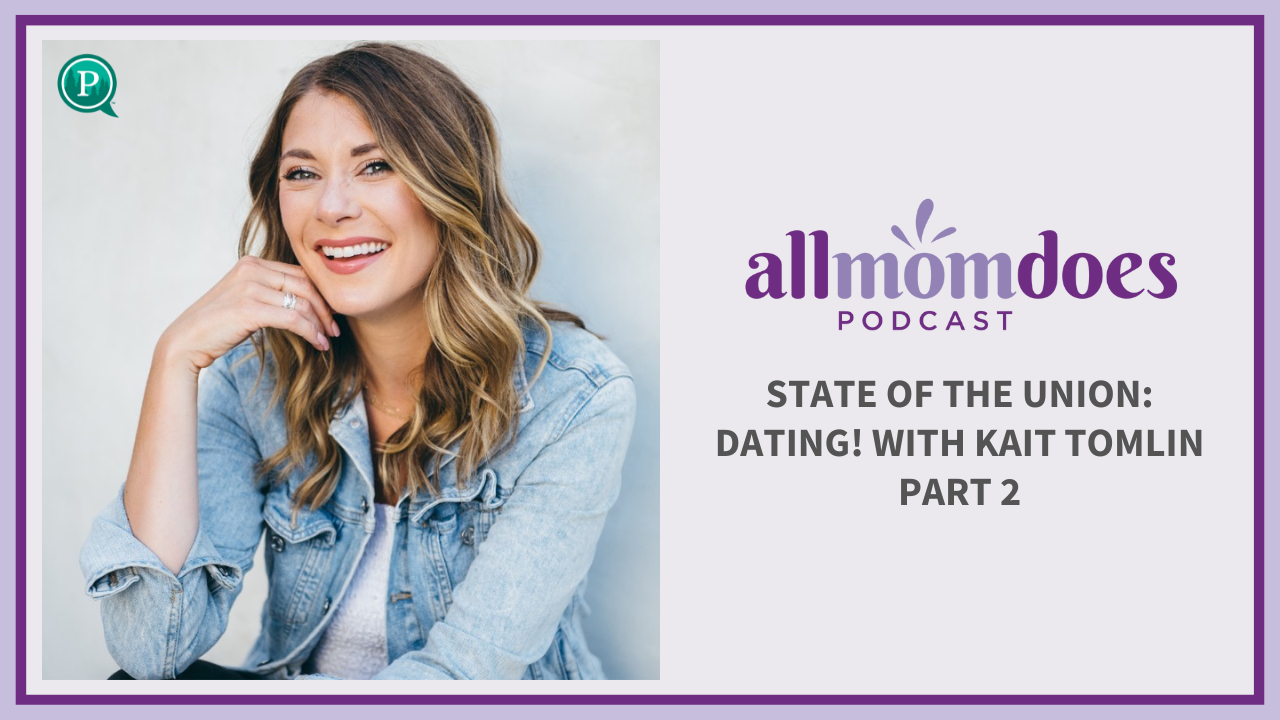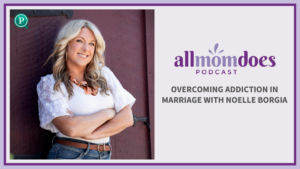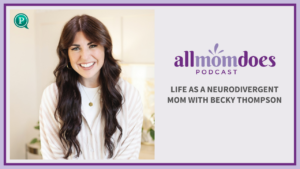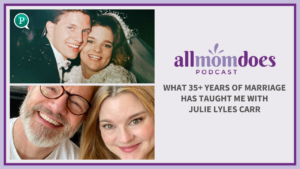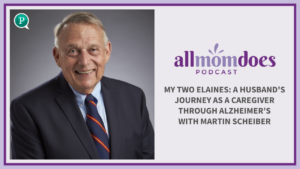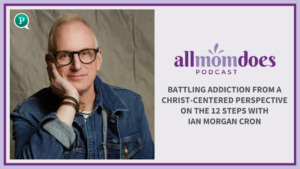Listen in today for Part 2 of our conversation with founder of Heart of Dating Kait Tomlin about what red flags to look for in dating, why we can often overlook the person who could be perfect for us, and how what we say about dating, men, and women is so important when it comes to equipping our kids in their pursuits of love on this episode of The AllMomDoes Podcast with Julie Lyles Carr.
Show Notes:
Find Kait: Online | Instagram | Facebook
Book: School Of Dating
Find Julie: Online | Instagram | Facebook | X (Formally Twitter) | Pinterest
AllMomDoes | Instagram | Facebook | X (Formally Twitter)
Transcription:
Julie Lyles Carr:
We are back today with part two of a two part episode that we’ve been doing on dating, whether you are trying to help your kids in the dating world, whether you yourself are in the dating world. I’m Julie Lyles Carr, and this is the AllMomDoes podcast. Again, this is the second part of a conversation that I’m having with my friend Kait Tomlin, who has a ministry called Heart of Dating, where she really delves into the modern landscape of what dating looks like today, the things we want to look out for, the ways we want to equip our kids or equip ourselves. I am so excited for you to hear the rest of my conversation with Kait Tomlin.
Kait, let me ask you this because, again, we’ve been talking a lot to parents about how to handle this whole topic of dating and all of these things, but I have listeners too who, through one life circumstance or another, are finding themselves single again and they are walking into a whole new dating world that may feel very different than when they were in their first relationship. One of the things that I continue to find fascinating, there are ways that I think we are doing a good job and doing a good job even in our faith circles, of reminding women of their worth, of reminding women of their identity, of reminding them that it is an awesome and amazing thing to be created by God to be a woman, it’s phenomenal. Yet I still find, and I have to check this in myself, that male validation of who I am as a woman can set us up for all kinds of challenging things.
Now, at the same time to what we were talking about earlier, unfortunately a lot of times we think of repair as going 180 degrees instead of going maybe a 32 degree correction would be the thing to do. Instead, we flip all the way over to where no man is ever, I don’t care what a guy ever thinks. I’ve seen particularly women who’ve been hurt either run headlong into another relational disaster to get that validation that they need after a rejection or a deep hurt or I’ve seen this swearing off of ever caring what any guy ever thought ever again, which doesn’t seem to be a really healthy place to build the next relationship from either. What are you seeing with the singles you work with who are single again, some of the challenges that they’re facing, some of the things that they’re needing to overcome to get them to a place of healing, to be ready to be welcoming for a future relationship, should God bring that to them?
Kait Tomlin:
Great question. We do have a lot of divorcees or widows in our community and single parents and/or just singles that are single later in life, they may be never were married, but are finding themselves being like, “What happened? Why am I 40 and single?” I would say a big part of this is there’s no rush… There should be no rush in saying, “Oh gosh, I’m 40 now, and that relationship I was in, whether it was a serious relationship or whether it was a marriage, I wasted some of my time there. I need to get back on it. I need to get this going.” God has a significant plan for your life and the worst thing you could do is ever rush back into dating until you’ve really done some deep inner work of healing, sorting that out, figuring out truly where you went wrong in that relationship. How did this lead to divorce?
I’m not saying it’s 100% your fault by any means, I’m sure there was a lot of dynamics, but I do think sometimes there’s a tendency to just blame it on the other person, victimize yourself and villainize the other person and just, “I’m so glad I’m over that. I’m ready for the next,” versus saying your husband or that person may have been a really poor partner and they may have been really bad in some ways, and what does that show you about you? For example, I was in a three and a half year really abusive relationship, and I don’t blame myself for being in that relationship. However, after there was a lot that I needed to look at about myself and why I even entered into that relationship in the first place, what signs I missed, what was lacking in myself that made me drawn to this man’s love bombing that happened to the very early parts, what made me want to perform for this guy when I realized that he was playing games and there were other girls in the picture, instead of leaving, I started performing.
I started really trying to get him to see me. There were just so many parts to it that came back to the way I initially originally saw myself, a very deep lack of love, kindness, and compassion for myself, and a very deep level honestly of self-hatred. I say this all the time, but if you don’t love yourself, somebody else can’t possibly truly love you. You’re going to also accept a certain kind of love if you don’t already love yourself and know the value that you bring, you’re going to more easily accept a certain kind of love. I had to really balance the process of healing, of saying I don’t blame myself, and there are parts to that that did lead me to get there. I have to be honest with myself that those parts of myself need healing, deep healing because I never want to end up in that circumstance ever again.
It is very easy after an abusive relationship or some really traumatic ending of a relationship to just, “Oh, that guy sucked. He had problems. He’s emotionally unavailable, he’s narcissistic.” We say all the things. Some of those things might be true, but also you had a part to play in that and God wants to reveal, “Hey, what happened that made you stay in that relationship? What drew you to that person to begin with?” There’s a lot of healing that needs to be done, and so please, please, please take whatever time you need to really suss out those things for yourself. I had to go through a season of no men entirely in my life to figure out and rebuild up who was Kait outside of men and this horrible relationship that I had been through. For some people, you’re going to need that.
And so just never underestimate healing and never underestimate God’s perfect timing in your life. As cheesy as that sounds, there’s no rush to find someone else. You want it to be God’s timing. You really want it to be where you are in a healthy place, as healthy as you possibly can be, you’re not going to be perfect, but you want it to be a place where you’ve processed, you know who you are, and you’re confident in who God has created you to be. You want to know your weak spots, your blind spots. You want to know your tendencies in dating and relationship and even marriage if you’ve been married before, and you want to heal those things so you can come to a new relationship.
I actually think if you do that work… Some of my divorced friends that I know who’ve done that work are some of the most eligible people on the planet, okay, because they have done this work, they’ve actually been married, they have wrestled through what their part was and the falling out of this marriage. They have gone through deep layers of healing and they are like… They got it. They’re like, “I’m ready to do this now in a very right way, and I’m not afraid to admit my weaknesses, I’m not afraid to get help when I need to get help. I’m looking for certain things now that I wasn’t looking for before.”
I think some of my divorced friends, I’m thinking of a few guys that I know, are some of… Ladies, if you’re here and divorced, message me. I’ve got some great divorced male friends that I know, but they are some of the most eligible people because they have done the work and they know what it’s like to have a thriving relationship. They know what it’s like to not have that, and they know what it would take to have a thriving relationship, a thriving marriage. That can be you as well. For anybody who tries to make you feel, and I’ll just say this, if anybody does try to make you feel less than for having a marriage, because I know a lot of divorcees say in the church, they feel really ostracized, I just want you to know that is not correct. That is not right. God does not see you that way. You are not broken and too lost or too behind in this process. The right person that is built for you will not see that as a stain on your past.
If you’ve done the work, they’re going to see, “Wow, this person God has moved in so many beautiful ways in their life and I am amazed by their story and I’m amazed at the person they are today.” They’re not going to see and compare themselves to your past relationship or see it as something of like, “Oh, you’ve been through that? Gosh, I don’t want to be with you.” I mean, I’m so glad JJ didn’t do that to me, because though I hadn’t been married, I’d been through so many awful situations and bad relationships, and the most healing thing that can happen is somebody saying, “Hey, I see you for who you are today, and I don’t judge you for a single thing that’s happened in your past.”
Julie Lyles Carr:
So beautiful, so beautiful.
Kait Tomlin:
Yeah, man, I have such a heart for people who’ve been divorced. It’s just… Yeah, I really, really, really do.
Julie Lyles Carr:
Yeah. Talk me through, and we’ve touched on this a little bit before, but you’ve been very open in saying JJ was unexpected, JJ was not who I necessarily of my own volition would’ve gone, “Oh, that’s the match. That’s the one.”
Kait Tomlin:
Yes.
Julie Lyles Carr:
Kait, I find myself in conversation at times with women… I don’t ever want women to second guess themselves in terms of being clear about what they’re attracted to and what they like. I’ve seen people, and you have too, decide, “Okay, I really will marry the guy who’s been my buddy all these years because time’s clicked by, and maybe it’s me, maybe this is a Harry Met Sally moment,” and it has not been a good decision because they weren’t really honoring who they’re wired to be. At the same time, I have watched women just get so desperate over attracting a certain avatar of a kind of guy, and it’s always a disaster, and yet somehow they think they’re going to turn him into a faithful, God-fearing, compassionate, thoughtful person when he’s not. He’s gorgeous, but he’s not going to be those things.
How do you talk to women about both honoring what you’re truly attracted to, but leaving space for God to surprise you, but also to let go a little bit of some of these avatars that we develop? What are some of the red flags that we should make non-negotiables that sometimes we are not kind of willing to out of a sense of desperation of trying to be with someone?
Kait Tomlin:
So good. I could go on forever about types and why our types are the way they are. We teach a whole segment in our program, School of Dating, about this because there’s so much that goes into why you’re attracted to the things you’re attracted to. There’s so much. I’m going to try to give you a snippet because I would normally teach on this for like an hour. I could go into and we can hyper-analyze why you’re attracted to those things and what childhood wounds have caused you to be attracted to those things. People don’t want to admit, but a lot of things that we’re attracted to actually have come from woundings in our childhood, woundings earlier in life, and where we have deficits inside of ourself, we’re looking for another person who fits certain molds because it will then fill our deficits and we don’t have to fill those things on our own if we get it from another person, but we need to fill those things on our own.
It’s like a lot of women who are very set on height, “I can’t date a guy who is shorter than me or the same height as me, or he has to be a certain height.” That’s a big one, and that one is often driven by a deeper insecurity in yourself, a deeper insecurity in your body and the woman that you are and your femininity. I’m getting so real here because I know it’s a really touchy subject, but women are just like, “No, that’s my standard.” I’m like, “Actually though, let’s ask you why. Why is that your standard?” Then, “Well, I don’t feel safe around a man that’s my height.” Okay, I’m pretty sure Tom Cruise in Mission Impossible is five foot six, and he’s a really great athlete, okay?
Julie Lyles Carr:
He could take you.
Kait Tomlin:
So the reality of just a shorter guy is not strong or can’t protect me is false. That is actually false. I mean, it’s just not true. There’s more going on for you that actually needs to be sussed out, and usually that comes from woundings and insecurities and things that we’re not necessarily willing to face. Same thing with, “Oh, I won’t date that guy, he’s not that attractive and he’s not my type.” The reason why you don’t want to date a guy that you think in your mind is a six or seven out of 10 attractiveness level is because if you dated him, that would make you a six or seven out of 10, and that would reinforce you feeling not beautiful and you feeling ugly. It comes back to, “Oh, I can’t date that person because I see them in this way. If I date them, that’s going to make me feel a certain way.”
But if I get the nine or 10 out of 10 guy, then I will feel beautiful instead of I feel fully beautiful and I don’t need to be with a person that’s attractiveness level is the same as a Ralph Lauren model. I can be with a guy who I find attractive, but they don’t need to be a model because I know and I feel confident about how I look and my beauty. Anyway, I can go a lot on that, but a lot of times we’re looking for things that are unavailable and then we attract things that are unavailable, and then we wonder why those things don’t work out for us.
Julie Lyles Carr:
Why they’re simply not available.
Kait Tomlin:
They are not available, they weren’t good for you in the first place. Then, here’s the sweet Christian guy, maybe a little shorter, maybe a little bit nerdier who loves Jesus consistent, is pretty secure, and you’re like, “Ew, no, not him.” I’m like, “Okay.” Now, I don’t want you to marry somebody who you’d never want to kiss in your entire life, of course not. But we also teach in School of Dating, there’s multiple layers of attraction, it’s not just physical. Physical is what we see first, but there’s spiritual, there’s intellectual, there’s personality, there’s emotional, and then there is physical. But I’m telling you, if you got the hottest guy on the planet, but those other four buckets are empty, it is not going to sustain. I’m telling you what, you’re going to be grossed out by him through time, it doesn’t matter how pretty he is, okay?
You want the layers of attraction to be balanced. You want all five layers to be balanced. I’ve dated really attractive men, some models, but they had very low emotional attractiveness to me, like they were not safe places for me, or spiritually they had very little good walk with God, and we should be more attracted to those things than the outward appearance. Also, with JJ, his physical… He is a very attractive man, but for me at first with his style, he had blue hair, he was five and a half years younger, he looked a little strange. He had a skater punk vibe going on, and it was not my “thing”, okay, physically. Physical bucket for me was not up there because, not that he wasn’t attractive, because those things were throwing me off, but his character, his emotional, the emotional connection, his emotional safety, his love for God more than any guy I’d ever dated, his intellectual, he could have great conversations.
His personality was so fun. We had a great friendship. All of that made it so that his style, the blue hair, and all these weird things, and the age gap didn’t matter. Physically, I grew more and more attracted to him. We have to be more open to date the unexpected. On dating apps, we eliminate people all the time for silly things like weight, ethnicity, height, all sorts of physical qualities that are silly, truly at the end of the day, if you really, really, really think about the lifetime with someone. Man, I can go on and on, Julie, about this, but I’m really passionate about it. A lot of people get so spicy they’re like, “Kait, I’m not going to date a guy I’m not attracted to.” I’m like, “I’m not telling you to do that. I’m telling you to just expand, think about it.” Okay, one thing, think about your type. Has your type worked out for you, truly? Has it worked out for you?
Because if it hasn’t, it might be trying to shake things up and maybe try what I’m saying and give the unexpected guy that you maybe wouldn’t have been into at first that has great character an opportunity.
Julie Lyles Carr:
Right. I love that. I think too, as women, we need to stand in integrity in this way. I’ve seen women who’ve been so offended by the way that men objectify them by swiping through dating apps, “No, she’s not hot enough. No, she’s not that,” and yet I have watched girls do the very same thing to guys. If we’re not willing to own that, then we can’t have an expectation of somebody we might be interested in dating seeing us any differently. That’s one of those places that the hypocrisy of it is pretty significant, and yet I see it a lot that we do these things.
Well, Kait, I know that you do a big conference for dating, I know that you have the classes that you do. What are some of the things that you find in doing those and in this work that is so important that continue to fuel you? Because now you are married and now you have walked through these different things. I’ve loved seeing this iteration of your career where you’ve moved from dating and being very transparent in talking about all the things that were going on with that through your relationship with JJ leading to marriage. What’s on the horizon now? How does your audience receive you now that you have come through the dating and the marriage?
Kait Tomlin:
Yeah. For me, I don’t have a heart that has grown away from singles, and I will keep saying that my heart is for singles. I’ve been way longer single in my life than I have been married. I’ve been married for a year, but single way longer than that in my life, and so my heart burns for singles and burns for the things that I wish I had known even earlier in my life but I’m so glad that I grew to learn and had the years of singleness before I met JJ that I truly loved and thrived in. I’m so passionate about women and men finding freedom from hopelessness, loneliness, disappointment, and self-hatred, and really seeking the Lord and seeking a full thriving single life. On our wedding day, which was about a year ago, I truly grieved in a sense that I was leaving my singleness. I was so excited about marriage, but I grieved like, “Wow, I’m leaving this beautiful-filled season,” and that’s sad for me. There’s a grief to that.
I’m so excited about this, but I’m not like, “Bye Felicia, I’m onto the next, I hated my singleness.” It was like, “No, I really grew to be the woman I am today, and I love those years of flexibility and deeper dives with Jesus,” and I really grieved it, and so did JJ. I would say one big thing that I love to say to singles is what legacy are you going to leave in your singledom? That’s my favorite thing to keep singles focused on. Marriage is great, you can definitely have that desire, but don’t let that desire overrule what God’s doing right now in your life because He wants to do awesome things with your life wherever you are in it right now. Anyway, we’re still doing stuff, we’re still doing the conferences, but we are just so on fire for supporting singles in their season.
Julie Lyles Carr:
I love that. Such a unique ministry, such unique insight and wisdom. Kait, where can the listener go to find out more about you, all the stuff that you’re doing, all that good stuff?
Kait Tomlin:
Yes. Heartofdating.com has everything. We have a blog, podcast, the conference info will be on there, our program’s on there. We have Instagram. I’m Kait [inaudible 00:20:29], Heart of Dating, JJ Tomlin, those are all of our accounts. But we have a massive Facebook group, if you are single and over 18, you can join our Facebook group and meet other awesome singles, both in a friendship way or if you want to meet someone. It’s also… People meet all the time in our group of Facebook.
Julie Lyles Carr:
You’ve had some success stories.
Kait Tomlin:
Oh, yeah. There’s about, I mean, maybe like 14,000 people in it now, so there’s a lot of people in there that you could potentially meet as just friends or more.
Julie Lyles Carr:
Yeah, I love that. Well, we’ll have Rebecca get all those links into the show notes. Listener, make sure you go to the show notes because you’re going to find a transcript of what we’ve talked about and links to all the great stuff. Kait, thank you for being so generous with your time, your insight, your wisdom, your heart. It’s just always a joy to get to talk to you.
Kait Tomlin:
Oh, you too, Julie. Thanks for having me.
Julie Lyles Carr:
Listener, listen, grab the link from this podcast and send it to someone who you know could use this information, whether they’re grappling with how to help guide their kids in the world of dating, or maybe you have a friend who’s single again and really struggling. I think that what we’ve been able to talk about on this episode is going to be so important to them. Check out AllMomDoes. AllMomDoes.com, AllMomDoes on all the socials, and I’m Julie Lyles Carr on all the socials also, we love to interact with you there. Make sure you’re subscribed. Hey, we really love it when you leave a five star rating and review, so that would be fantastic if you would do that. I’ll see you next time on the AllMomDoes podcast.
Follow this podcast:

